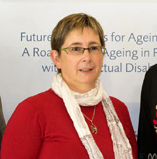 Decision-making support to people with cognitive impairment needs to be substantially improved. Recent studies from the La Trobe University Living with Disability Research Centre, has identified factors that underpin the delivery of effective decision-making support for people with cognitive impairment due to intellectual disability or acquired brain injury. The researchers believe the study results can be utilised to develop capacity-building education programs for those providing the decision-making assistance.
Decision-making support to people with cognitive impairment needs to be substantially improved. Recent studies from the La Trobe University Living with Disability Research Centre, has identified factors that underpin the delivery of effective decision-making support for people with cognitive impairment due to intellectual disability or acquired brain injury. The researchers believe the study results can be utilised to develop capacity-building education programs for those providing the decision-making assistance.
According to Professor Christine Bigby, director of the research centre, support for decision-making has not been done well. “Research shows that people with cognitive disability have very limited or no involvement in either major or minor decisions that affect their lives.”
Efforts to rectify this situation have recently been championed by the Australian Law Reform Commission which is focusing on establishing new legal structures for support with decision-making, Professor Bigby told F2L.
“Our own qualitative studies have revealed multiple factors that impact on the process of providing support and afforded insights into why existing practice has delivered only limited outcomes. Our findings suggest that the interest of supporters can consciously and unconsciously dominate decisions.
“What we have discovered is that people with cognitive disability have a ‘positive’ or ‘successful’ experience of decision-making support if this is provided by one or more individuals where there is a trusting relationship and a knowledge of history and goals, including previous decisions and outcomes.” This is in addition to the level of functioning, flexibility and use of variable strategies that tailor the support to the needs of the individual and collaborate with them to reach the desired outcome, she said.
The researchers have identified four areas that have could have major implications for practice. These include: orchestration, commitment, support principles and strategy development. Factors that provide the foundation for training, resource development and evaluation, Bigby said.
Over one million Australians have cognitive impairment and as a consequence are high users of disability services. This group constitute over 60 per cent of participants in the NDIS and following the introduction of the NDIS has further emphasised the need for provision of effective decision-making support.
Professor Bigby convenes the Annual Roundtable on Intellectual Disability Policy at La Trobe University.
For more information visit: http://www.cadr.org.au
